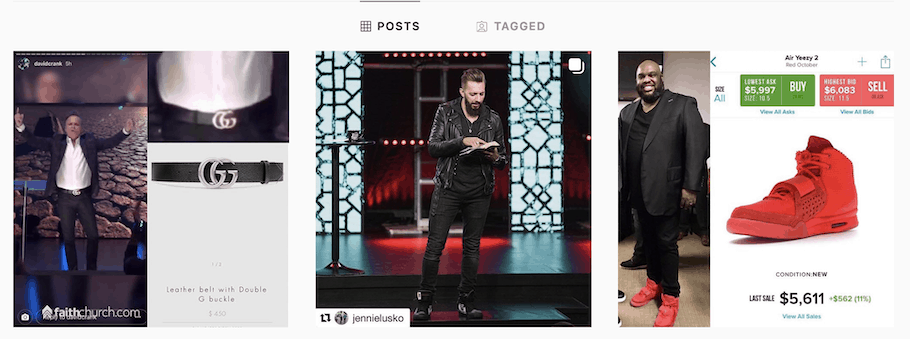Everyone is talking about PreachersNSneakers. Well, not everyone, I’m sure, but enough that it has ended up in my inbox plenty of times over the past few days. PreachersNSneakers is an Instagram account that simply shares photos of preachers in their sneakers. No big deal, right? It wouldn’t be, except that these are not just any preachers in any sneakers—these are mega-church pastors in mega-expensive sneakers (or, occasionally, other designer garb). It’s just the kind of thing that’s sure to catch the eye of BuzzFeed and, through it, to reverberate across the Internet. And, sure, enough, it is growing by thousands of subscribers each day.
John Gray of the Relentless Church in Greenville—who, you may remember, was recently in the news for gifting his wife a $200,000 Lamborghini—is shown wearing one pair of shoes that sells for $3,700 and another that rings in at close to $6,000. Chad Veach and Judah Smith (of ZOE church in Los Angeles and City Church in Seattle, respectively) show up again and again, always with shoes or other bits of swag that cost in the hundreds of dollars. On and on it goes.
So what’s the point and purpose of the account? Clearly it’s meant to expose the extravagance of some of the most prominent celebrity pastors, and it does that effectively. It shows them showing off their wealth by flaunting designer labels, by wearing clothes that are often as ugly as sin but expensive as gold. And clearly it’s also meant to expose their vanity, for the photos are almost entirely plucked from these men’s own accounts. The pastors have carefully shopped at the right stores, dressed themselves, taken the photos, edited them just so, and shared them with the world. They don’t only want to be seen, but they want to be seen in this way!
And it’s right here, I think, that we see the primary reason people are drawn to PreachersNSneakers: It forces the realization—or perhaps the confirmation—of what so many Christian leaders and their ministries are all about. They are not first pastors but influencers, their great desire is not to shepherd a local church but to build a personal brand, their personal brand is not in the realm of religion but lifestyle. Their brand is success and they prove their success through ostentatious displays of prosperity. Most of us just see sneakers, but to a select group—the group these people want to woo and win as followers—these sneakers signal far more. They stand as both proof and promise—“I am successful, for I have the sneakers. Follow me and you, too, can have the sneakers and all the success they symbolize.” In this way, this Instagram account is an illuminating, though disheartening, exposure of modern evangelicalism.
Yet as I browse the account I find my conscience a little uneasy. I find myself concerned about an element of schadenfreude, that I (or we) may be a little too delighted to have our suspicions confirmed and to see these pastors called out. I can’t help but wonder whether in my little Christian subculture there are different signals of success that we value above godly character. It’s not sneakers, but I’m sure it’s something. Then, I can’t help but wonder whether this is a game we actually want to play. Do we really want to train ourselves to go around looking at other people’s feet to determine whether or not they need a good public shaming? How expensive is too expensive, anyway? Who gets to determine which labels are acceptable and which are extravagant? There is peril down that road.
Our clothing reveals who we want to be known by and what we want to be known for.
At the same time, clothing really does matter, though perhaps not in the way we might expect. In the eyes of God, clothing really only matters to the degree that it dresses our hearts. Perhaps the Bible’s most prominent message about our clothes is a call to modesty. We tend to fixate on high hemlines or low necklines, but the Bible’s concern is character and humility. What Peter addressed specifically to female believers 2,000 years ago must be repeated broadly to the whole church today: “Do not let your adorning be external—the braiding of hair and the putting on of gold jewelry, or the clothing you wear—but let your adorning be the hidden person of the heart with the imperishable beauty of a gentle and quiet spirit, which in God’s sight is very precious” (1 Peter 3:3-4). I don’t think God gives a rip about the labels, but I’m convinced he cares a great deal for the heart behind the labels. What we wear on the outside has an interesting way of revealing what we really value on the inside. Our clothing reveals who we want to be known by and what we want to be known for.
We can’t forget or deny that by accepting the call to ministry, pastors accept a greater level of scrutiny—a scrutiny meant to consider what they are displaying to the church and the world around them. But while they are called to display something, it’s not labels or brands or prosperity or other markings of worldly success. Pastors are called to display godly character and are qualified only as long as they maintain it. The primary concern of pastors should not be the image they project but the character they display. In this way pastors need to ensure that what they wear doesn’t in any way conflict with the far more important display of Christ-like character. They need to know that their clothes will either complement or contradict the message of Christ. They need to be willing to deny themselves anything that might cause people to have trouble seeing past them to see Christ. They need to be the first to display the humility and modesty that is so very precious to God.
Through social media, pastors’ lives are on display in a whole new way, for good and for ill. Twitter and Instagram and all the rest are capable of amplifying the godly character that qualifies us or the worldly ambition that disqualifies us. But, of course, it simply reflects the reality that pastors are called to a public ministry in which they are qualified by the affirmation or disqualified by the de-affirmation of their own local church. Pastors whose great concern is gaining and displaying Christ-like character for the good of the people they serve will shop, dress, live, photograph, and Instagram accordingly.










